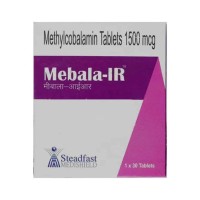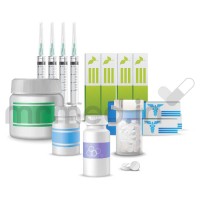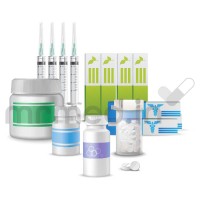Kryxana 200mg Tablet is an anticancer medication containing the active ingredient ribociclib. Cancer is a condition in which cells multiply in an uncontrolled and abnormal manner. It is used in women to treat a type of breast cancer (hormone receptor-positive, HER2 negative breast cancer) that is locally advanced or has spread to other parts of the body. This medication is given in combination with other medications. It can also be used in treatment of endometrial cancer in combination with other drugs. It works by inhibiting the activity of certain proteins, which regulate cell growth and division. By blocking these proteins, it can slow down or stop the growth of cancer cells.
Kryxana 200mg Tablet is not recommended for adolescents and children under 18 years of age. Before taking this medication, it is vital to inform your doctor if you have any signs of infections (fever, mouth ulcers, or sore throat), liver disorders, heart disorders, or if you are allergic to peanut or soya. You should not drink grapefruit juice or eat grapefruits during the treatment with this Tablet. It should not be used in person who have a known hypersensitivity or allergy to Kryxana 200 mg Tablet or any of its components. It is important to discuss any potential contraindications with your doctor before starting treatment. Possible side effects include low white blood cell counts, fatigue, nausea, diarrhoea, and hair loss. It is only prescribed for patients who have already gone through menopause. It is not recommended for premenopausal women or for women who are pregnant or breastfeeding.
Therapeutic Effects of Kryxana 200mg Tablet
Pregnancy
Kryxana 200mg Tablet is unsafe for pregnant women as it may cause foetal harm if taken during pregnancy. So it is recommended to avoid it during pregnancy.
Breast Feeding
Kryxana 200 mg Tablet is unsafe for use during breastfeeding. Because of the potential risk to the infant, breastfeeding is not recommended during treatment.
Lungs
Kryxana 200mg Tablet has been associated with some lung-related side effects, although these are relatively uncommon. Consult your doctor if you have any lung diseases before starting the treatment.
Liver
Regular monitoring of liver function tests is recommended because it has been associated with liver injury in some patients. It is important to monitor liver function regularly in patients taking Kryxana 200mg Tablet, particularly in those with pre-existing liver disease or a history of liver problems. It is unsafe for the patients having liver failure.
Alcohol
It is generally recommended that patients taking Kryxana 200mg Tablet avoid or limit their alcohol intake, as alcohol can increase the risk of liver damage and exacerbate any liver-related side effect.
Driving
Kryxana 200mg Tablet may cause side effects such as fatigue, dizziness, or blurred vision that can impair a patient's ability to drive or operate machinery safely. So it is not recommended to drive or operate machinery safely while treatment.
Side effects are unwanted symptoms caused by medicines. Even though all drugs cause side effects, not everyone gets them.
Serious:
- Dehydration
- Kidney problems
- Electrolyte imbalances
- Liver damage
- Pneumonitis (inflammation of the lung wall)
- Difficulty in breathing
- Chest pain
Common:
- Diarrhoea
- Nausea
- Vomiting
- Fatigue
- Decreased appetite
- Abdominal pain
- Headache
- Respiratory tract infections
- Anaemia
- Increased risk of infections
- Low white blood cell count
- Low platelet count
It is important to avoid grapefruit during treatment as grapefruit reduces effectiveness of the this medication. Remember to attend all scheduled appointments and follow-up visits with your healthcare provider to ensure that your treatment is effective and any side effects are managed appropriately. With proper monitoring and management, it can be an effective treatment option for certain types of cancer.
Kryxana 200mg Tablet may affect fertility in women, and it is recommended to use effective contraception during treatment and for at least 21 days after the last dose. It is unclear whether it can cause permanent infertility in women.
Kryxana 200mg Tablet is primarily used to treat hormone receptor-positive, HER2-negative advanced or metastatic breast cancer.
Kryxana 200mg Tablet is not a cure for breast cancer but can help slow the disease's progression and improve survival rates in certain cases.
Liver damage is a rare but serious side effect of Kryxana 200mg Tablet. Signs and symptoms of liver damage may include yellowing of the skin or eyes (jaundice), dark urine, pale stools, abdominal pain, nausea, vomiting, fatigue, or loss of appetite.
Yes, it is important to maintain a healthy lifestyle while taking Kryxana 200mg Tablet, including eating a balanced diet, getting regular exercise, and avoiding smoking and excessive alcohol consumption.
Yes, Kryxana 200mg Tablet is often used in combination with other cancer treatments, such as chemotherapy, radiation therapy, or hormonal therapy, to treat breast cancer. However, the specific treatment plan may vary depending on the individual patient's condition and response to treatment.
Molecule name: Ribociclib | Therapeutic class: Anticancer |
Pharmacological class: Cyclin-Dependent Kinase Inhibitors | Indications: 1. Advanced or metastatic breast cancer 2. Advanced or metastatic endometrial cancer |










